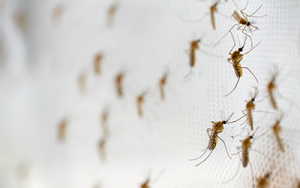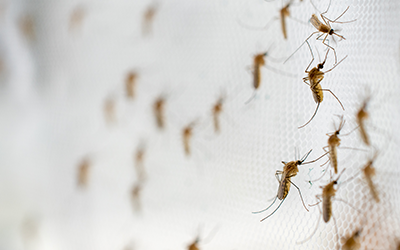 As the sun begins to set on summer, the allure of its warmth still lingers in Georgia. Residents are savoring the last moments of this season – grilling up delicious cookouts, preparing kids for the return to school, and relishing the comfort of front porch gatherings with loved ones. While we soak in the fading heat that ushers in fall, another group is also making the most of these late summer days: pests.
As the sun begins to set on summer, the allure of its warmth still lingers in Georgia. Residents are savoring the last moments of this season – grilling up delicious cookouts, preparing kids for the return to school, and relishing the comfort of front porch gatherings with loved ones. While we soak in the fading heat that ushers in fall, another group is also making the most of these late summer days: pests.
The vibrant blooms of gardens, the overripe bounty of fruits scattered across yards, and even the unsealed lids of garbage bins all act as magnets for these unwanted guests. With winter on the horizon, they’re seeking a comfortable haven, and your home is on their radar.
Most Common Late Summer Pests
While some might assume that pests retreat as the temperatures drop, it’s quite the opposite for many kinds of pests in Georgia. Late summer months, specifically August and September, witness a surge in the activity of certain pests that can leave residents and homeowners facing unique challenges.
- Mosquitoes: These pests thrive in summer, and by late summer their swarms can be quite massive. Georgia’s humid and rainy summers can produce hidden pockets of standing or stagnant water – which is where these pests breed – in many places on your property.
- Flies: House flies and fruit flies thrive in the humid warmth of late summer. Garden blooms, fallen fruit left in yards, food left out or uncovered, and unsealed garbage bins will invite these pests onto your property, and you can easily find your home overrun with them.
- Ants: In late summer ants are typically busy foraging for the queen, and if they find your home to be a food resource, you can have a hard time keeping them out without professional assistance as they are well known for leaving pheromone trails that they’ll come back to relentlessly.
- Bees, Wasps & Hornets: Most pests have a sweet tooth, most notoriously of which are these stinging pests. Fruit-bearing trees on your property, white flowers more so than others, and sweet foods in unsealed garbage bins will attract them to you. By late summer, their nests have been established and their numbers have grown, making a potentially dangerous encounter more likely.
- Ticks: More outdoor activity means more opportunities for picking up one of these unwanted hitchhikers. Relatives of the arachnid, ticks find their way onto us or our pets through tall grass, weeds, shrubs, and bushes. Additionally, these pests are well known to spread some pretty nasty diseases like Lyme Disease and malaria.
- Cockroaches: These pests are known for preferring warm and humid environments, making Georgia summers the perfect breeding time for them. With their numbers increased by late summer, you’ll have a higher chance of an unwanted infestation as they enter your home in search of food sources. If you see one, you can guarantee that there are many more.
- Spiders: Late summer is perfect for these pests to be active inside your home as they seek out the milder indoor temperatures and the higher likelihood of food sources like flies or ants. Giant house spiders are one of two species known to be most active in summer, so if you notice a large amount of spiders in your home, you may have an infestation issue.
- Rodents: Open doors, broken screens, holes in walls or along the roof, are all easy entry points for mice and rats. Late summer has these creatures looking for a nice cozy place to nest down for winter, and your home may provide the perfect place.
- Snakes: With the increased activity of rodents seeking shelter, you’ll also notice they bring with them their predators. Georgia has a few native snakes that love the warmth and moisture of our humid summers, some of which are venomous, so be sure to have snake prevention measures in place.
Active Pest Control, Your Partners in Pest Management and Prevention
Whether you’re in immediate need, or seeking year-round prevention, the professionals at Active Pest Control are here to help. With over 45 years of experience serving the state of Georgia, our team is dedicated to providing expert pest protection. If you’ve found yourself battling a pest infestation, or would like to establish a prevention plan, don’t hesitate to contact us today!

